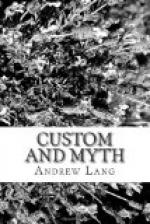their religions from each other. When the Greeks
first found the Egyptians practising mysteries like
their own, they leaped to the conclusion that their
own rites had been imported from Egypt. We,
who know that both Greek and Egyptian rites had many
points in common with those of Mandans, Zunis, Bushmen,
Australians—people quite unconnected with
Egypt—feel less confident about the hypothesis
of borrowing. We may, indeed, regard Adonis,
and Zeus Bagaeus, and Melicertes, as importations
from Phoenicia. In later times, too, the Greeks,
and still more the Romans, extended a free hospitality
to alien gods and legends, to Serapis, Isis, the wilder
Dionysiac revels, and so forth. But this habit
of borrowing was regarded with disfavour by pious
conservatives, and was probably, in the width of its
hospitality at least, an innovation. As Tiele
remarks, we cannot derive Dionysus from the Assyrian
Daian nisi, ‘judge of men,’ a name of the
solar god Samas, without ascertaining that the wine-god
exercised judicial functions, and was a god of the
sun. These derivations, ‘shocking to common
sense,’ are to be distrusted as part of the
intoxication of new learning. Some Assyrian
scholars actually derive Hades from Bit Edi or Bit
Hadi—’though, unluckily,’ says
Tiele, ‘there is no such word in the Assyrian
text.’ On the whole topic Tiele’s
essay {28} deserves to be consulted. Granting,
then, that elements in the worship of Dionysus, Aphrodite,
and other gods, may have been imported with the strange
AEgypto-Assyrian vases and jewels of the Sidonians,
we still find the same basis of rude savage ideas.
We may push back a god from Greece to Phoenicia, from
Phoenicia to Accadia, but, at the end of the end,
we reach a legend full of myths like those which Bushmen
tell by the camp-fire, Eskimo in their dark huts,
and Australians in the shade of the gunyeh—myths
cruel, puerile, obscene, like the fancies of the savage
myth-makers from which they sprang.
The bull-roarer.
A Study of the Mysteries.
As the belated traveller makes his way through the
monotonous plains of Australia, through the Bush,
with its level expanses and clumps of grey-blue gum
trees, he occasionally hears a singular sound.
Beginning low, with a kind of sharp tone thrilling
through a whirring noise, it grows louder and louder,
till it becomes a sort of fluttering windy roar.
If the traveller be a new comer, he is probably puzzled
to the last degree. If he be an Englishman, country-bred,
he says to himself, ’Why, that is the bull-roarer.’
If he knows the colony and the ways of the natives,
he knows that the blacks are celebrating their tribal
mysteries. The roaring noise is made to warn
all women to keep out of the way. Just as Pentheus
was killed (with the approval of Theocritus) because
he profaned the rites of the women-worshippers of
Dionysus, so, among the Australian blacks, men must,
at their peril, keep out of the way of female, and
women out of the way of male, celebrations.




